The splicing regulator Rbfox2 is required for both cerebellar development and mature motor function
- PMID: 22357600
- PMCID: PMC3305983
- DOI: 10.1101/gad.182477.111
The splicing regulator Rbfox2 is required for both cerebellar development and mature motor function
Abstract
The Rbfox proteins (Rbfox1, Rbfox2, and Rbfox3) regulate the alternative splicing of many important neuronal transcripts and have been implicated in a variety of neurological disorders. However, their roles in brain development and function are not well understood, in part due to redundancy in their activities. Here we show that, unlike Rbfox1 deletion, the CNS-specific deletion of Rbfox2 disrupts cerebellar development. Genome-wide analysis of Rbfox2(-/-) brain RNA identifies numerous splicing changes altering proteins important both for brain development and mature neuronal function. To separate developmental defects from alterations in the physiology of mature cells, Rbfox1 and Rbfox2 were deleted from mature Purkinje cells, resulting in highly irregular firing. Notably, the Scn8a mRNA encoding the Na(v)1.6 sodium channel, a key mediator of Purkinje cell pacemaking, is improperly spliced in RbFox2 and Rbfox1 mutant brains, leading to highly reduced protein expression. Thus, Rbfox2 protein controls a post-transcriptional program required for proper brain development. Rbfox2 is subsequently required with Rbfox1 to maintain mature neuronal physiology, specifically Purkinje cell pacemaking, through their shared control of sodium channel transcript splicing.
Figures
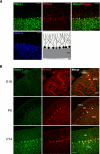
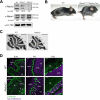

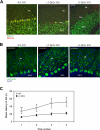
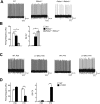
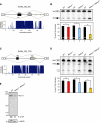
References
-
- Barski JJ, Dethleffsen K, Meyer M 2000. Cre recombinase expression in cerebellar Purkinje cells. Genesis 28: 93–98 - PubMed
-
- Bhalla K, Phillips HA, Crawford J, McKenzie OL, Mulley JC, Eyre H, Gardner AE, Kremmidiotis G, Callen DF 2004. The de novo chromosome 16 translocations of two patients with abnormal phenotypes (mental retardation and epilepsy) disrupt the A2BP1 gene. J Hum Genet 49: 308–311 - PubMed
Publication types
MeSH terms
Substances
Grants and funding
LinkOut - more resources
Full Text Sources
Other Literature Sources
Molecular Biology Databases
